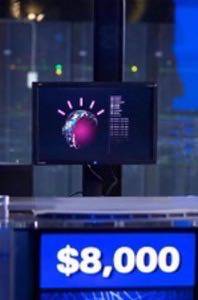We go into day two of the three-day Jeopardy contest with IBM’s Watson tied for first place with Brad Rutter. They each have $5,000. Ken Jennings has $2,000.

What does this show more than anything? This is a contest and nothing more.
It is not a scientific experiment to do a live broadcast of a game show with a contestant that is a machine. It is a game to use a television show to sell the concept of machine intelligence and set market expectations.
That expectation being that someday we will all have a Watson of our very own. It will be in the walls, perhaps, to answer our questions. It will know the language we speak. it will always be listening, mechanically processing what we say and adjusting the information to the algorithm that correlates the data.
So this game show exercise is not a scientific achievement of any kind. Watson, Rutter and Jennings are contestants. The show is on television. Advertisers pay to be part of the show. People watch it and tweet about it… a lot.
What the Watson Jeopardy Contest Represents
In our view, the opportunity for IBM is to discuss the context for Watson and move that conversation beyond the common-man-versus-machine stories that are popping up like cliches do when this topic moves past a tipping point.
IBM is offering a new alternative that shows the applications for machine intelligence. It’s not about cloud computing.
In this case, it is more effective to use a room full of servers to process natural language.
The screen that appears on the Jeopoardy program is connected to server racks that would encompass a large part of the studio floor where the Jeopardy game is taking place. Those servers are processing the data, which is being fed into an algorithm that is listening for subtleties of the natural language.
Watson listens to the question and takes the data score. It works down a decision tree and extracts the answer based on how narrow it can define the data set.
For example, that’s why it may not know about oddities. Obscure matters may be lost on it. It does not have enough data to know the context for what the oddities represent.
Watson will move on after the Jepoardy game and out of the contest spotlight. IBM is offering Watson for university research.
The applications? Watson may be in your doctor’s room someday, listening to your symptoms, parsing down your data, applying it to a decision tree, eliminating extraneous data about exotic diseases that have not been in your community for more than 100 years. It will take seconds to get from that point to insight about your condition.
There are limitless ways the technology can be applied.
Lost Opportunity?
Unfortunately, with any contest, there is a bit of a lost opportunity with the Jeopardy game.
MIT Professor Henry Lieberman writes that contests can be detrimental to science:
In the past few years, there’s been a fad for contests, “challenges,” “grand prizes,” etc. in scientific and engineering fields. I have no objection if it’s only good, clean fun between consenting adults. But on the whole, I think this fad has been detrimental to science. Contests encourage competitive attitudes and secrecy between contestants. They focus people on incremental progress in very specialized areas, for one-shot tests. Science needs exactly the opposite–collaboration between researchers, openness, a diversity of approaches and “out of the box” and long-term thinking. It needs the freedom to choose what problem to work on, rather than have it dictated by the arbitrary rules of the contest.
Let’s be clear: winning a particular contest is not, by itself, a scientific achievement. Science is not a contest. Science advances by learning general problem-solving principles. If it happens that scientists introduce new, general principles that enable them to win a particular contest, then a contest can serve as a public demonstration of their prowess. It’s great PR. But sometimes contests can be won by tricks or specialized techniques that don’t cause scientists to learn anything really new. It all depends on how it’s done. Scientists judge by the principles and techniques, not by the contest results. Even after the Jeopardy event, we won’t really know “who won” until all the details of how it was done are published in the scientific literature.
The Jeopardy contest is fun. But it’s important to keep in mind that this is a game. Scientists study games. They conduct experiments about games. Using games as research lab? That’s a practice you will most likely only see on television.










